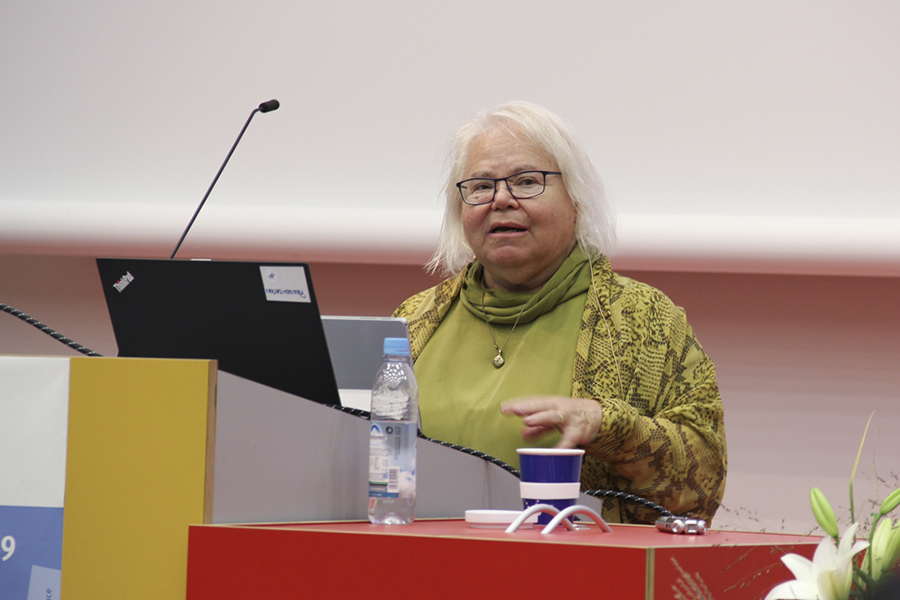Eve Marder receives Valentin Braitenberg Award for Computational Neuroscience 2021
Eve Marder, pioneering neuroscientist and internationally renowned for her work on the lobster and crab nervous system will receive this year's Valentin Braitenberg Award for Computational Neuroscience. The award ceremony will take place during the online Bernstein Conference on September 23.

Eve Marder, Bernstein Conference 2019, photo: N. Schwarzer, Bernstein Network
/BN, Duppé/ Eve Marder is a pioneer in a multitude of ways. During her long and distinguished career, she was breaking ground as a neuroscientist; her thinking outside the box marks her as a curious mind and her students treasure her as a great mentor. The award committee of the Valentin Braitenberg Award honors Marder as “an extremely creative researcher whose insights have inspired the field and who has greatly contributed to strengthening the link between computational and experimental approaches.” (Susanne Schreiber, member of the jury and spokesperson of the Bernstein Network) Upon receiving the news of the award, Marder felt very “pleased and flattered.”
Eve Marder and her research
Eve Marder’s research focuses on the stomatogastric-ganglion (STG) system of lobsters and crabs. Since the 1970s, she was intrigued by this circuit of 30 neurons that controls the food intake and digestive system of crustaceans. For computational neuroscience, this neural network provided ample research ground because of its manageable size and comparatively easy experimental accessibility, conditions that foster combined experiment-theory approaches. Marder’s research is incredibly diverse and revealed many basic principles of neuronal function, encompassing, for example, the interplay of network and cellular properties, neural homeostasis or temperature dependence of processing. Her work has fundamental implications for our view on the architecture and function of neural circuits.
Marder’s early work on neuromodulators has been assessed as marking a paradigm shift in neuroscience. She revealed that flexibility and stability in the brain are not a paradox but two sides of the same coin. Her research centers on how neural circuits remain stable in structure and function while neuromodulators are constantly reconfiguring its output. Together with her colleague, Larry Abbott now from Columbia University, NY, Marder developed a tool, the ‘dynamic clamp’, which is used worldwide to study neural systems at the cellular and circuit level. These two major achievements still influence her research. She and her group investigate the reconfiguration of circuits by neuromodulators, the reasons for the stability of neural networks as well as the variability of circuit function in the animal brain. Eve Marder herself states that “today we are focusing on individual variability across animals and how this is related to resilience to a variety of perturbations. I am particularly excited by recent experimental and computational work that shows that experience can alter the properties of the nervous system in ways that are ‘cryptic’ or hidden until the nervous system is challenged by an environmental perturbation.”
As a scientist Eve Marder has left a big imprint on the world of computational neuroscience. She has received numerous honors and awards during her career. Marder received the KAVLI Prize in 2016 and the US National Academy of Science Award in the Neurosciences in 2019, to name but two of the most recent. As a mentor she advised many scientists who are now in responsible positions at leading academic institutions around the world. As a spokesperson for science in an out of the scientific arena, she has become a major role model for young neuroscientists and STEM students in general.
The Valentin Braitenberg Award will be conferred to Eve Marder at the Bernstein Conference on September 23, 2021. Following the award ceremony, Marder will give the Valentin Braitenberg Lecture, in which she will present highlights of her research.
Valentin Braitenberg Award
The award is named after Valentin Braitenberg (1926, Bozen – 2011, Tübingen), one of the founding directors of the Max Planck Institute for Biological Cybernetics, Tübingen (Germany).
Braitenberg’s research area was the fine structure of the brain and its functional principles; his groundbreaking work focused on the cerebral and cerebellar cortex.
With financial support of the “Autonome Provinz Bozen Südtirol” the “Valentin Braitenberg Award for Computational Neuroscience” is now biennially conferred by the Bernstein Network within the framework of the Bernstein Conference.
>> more




